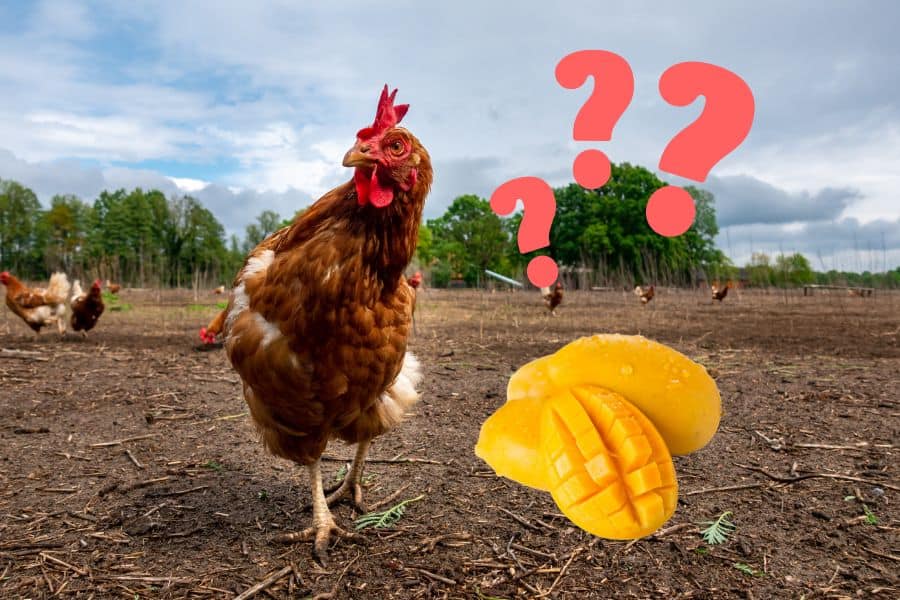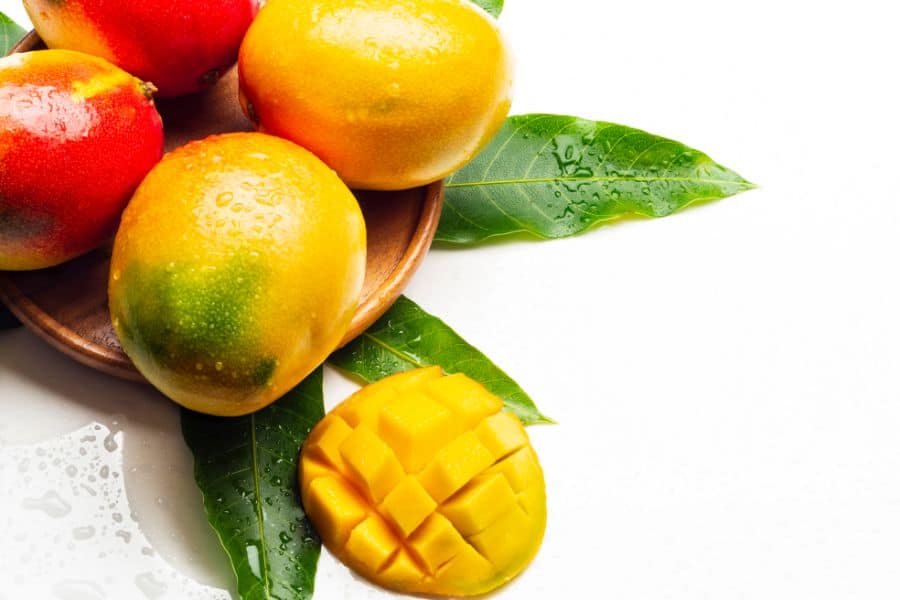Over a dozen domestic foods can poison your chickens, some leading to their death in just a matter of days. Watching what you feed them is crucial to caring for backyard chickens.
A good rule of thumb is only to include extra foods in the chicken feed if they are supplements; that includes mangoes. Mangoes are tropical fruit packed with essential vitamins and nutrients that can provide a healthy addition to a chicken’s diet. However, in excess, they can be dangerous.
Simply put, your chickens can safely consume mango fruits so long as it is in moderation. Mangoes should be considered a treat or supplement to a well-balanced chicken diet, primarily consisting of formulated feed, fresh vegetables, and grains. But why is that?
Read on to dive into how chickens digest mangoes and why some of the fruits and skin content can harm your lovely chicks. We’ll also address related queries about mango peels, skins, pits, seeds, and dried mango to ensure the well-being of your flock.
Can Chickens Eat Mangoes
Mangoes have high nutritional value. A typical 165-gram cup full of raw mango contains about:
- 20 different types of vitamins
- high sugar content: About 50 grams (g)
- calories: 99
- protein:35 g
- fat:63 g
- carbohydrate:8 g
- sugar:6 g
- fiber:64 g
- potassium: 277 mg
- beta carotene: 1,060 mcg
- lutein and zeaxanthin: 38 mcg
- folate: 71 mcg
Despite the many nutritional values, mangoes have a nutritional imbalance that can affect chickens that solely rely on mangoes as their main diet. To reduce the effects of the imbalance, it is recommended you feed them mangoes only if they do not exceed 10% of their daily intake.
And this is where the downsides start coming in. If chickens consume more mangoes than they should, they will be affected by lacking certain nutrients or getting too much of others.
The biggest downfall of this nutritional imbalance is the high sugar content.
Fun Fact: Did you know chickens have less than 360 total taste buds? This is significantly lower than an average adult human with up to 10,000 taste buds.
Because of their underdeveloped taste buds, chickens lack sweetness receptors responsible for tasting sweet flavors like those predominant in mangoes.
Of the five basic taste qualities (sweet, bitter, sour, salty, and umami), chickens can only taste three in normal quantities. Smaller bitter taste receptors and lack of sweetness receptors mean that chickens can only taste sweet and salty flavors if in high concentrations.
Chickens love to eat lots of mangoes, specifically for their high sugar content. Since they cannot taste sweetness properly, they may indulge too much, which will cause disruptions to their digestive systems.
High sugar content in a chicken causes a spike in blood sugar due to a high presence of sucrose, fructose, and glucose. The symptoms of this spike include diarrhea and obesity.
Diabetes is a rare symptom, but chickens are insulin-resistant, which makes excess sugar accumulation dangerous. Insulin-resistant animals cannot get rid of excess sugar in the bloodstream, leading to hyperglycemia.
Related symptoms following hyperglycemia include weight gain, high blood pressure, and inflammation.
All in all, the symptoms of eating too many mangoes do not apply across the board since different sizes and types of chicken process food differently. However, to err on the safe side, always ensure you keep the mango supplement to a maximum of 10% of the chicken’s daily intake.
Health Benefits of Feeding Mangoes to Chicken
As seen with the nutritional content in mangoes, you can tell that most benefits will include an improved immune system due to the number of vitamins.
1. Improved Immune System & Other Vitamin Benefits
According to the U.S. Department of Agriculture, a whole mango (about 336 grams) contains 122 mg of vitamin C, 3.02 mg of Vitamin E, and 3360 IU of Vitamin A.
Vitamin A helps Improves the immune system to help fight off common illnesses and pathogens. Also, Vitamin A deficiency can lead to serious effects, including affected growth rate, feed utilization, and bone development. Supplements from mangoes help improve the chick’s overall health.
Vitamin C, on the other hand, helps develop the skin, feathers, and tissues of the chicken. It also plays a huge role in maintaining overall health to boost immunity and attack pathogens or diseases.
Vitamin E is an antioxidant that helps in improving egg production and fertility. It also plays a part in improving the functioning of nerves, the circulatory system, and muscles.
2. Improved Digestion
Mangoes are known for their high fiber content, which aids digestion and promotes overall gut health in chickens.
Fiber also helps the chicken’s digestion by regulating bowel movements and preventing constipation. In some cases, the fiber can also encourage the growth of beneficial bacteria in the gut, which also help break down food in the digestive system.
3. Improved Egg Production
Potassium is the mineral responsible for increased egg production and egg weight. Small traces of calcium in mangoes also go a long way in working with potassium to increase shell thickness.
How to Feed Mangoes to Chicken
The key takeaway is to moderate the mango intake to less than 10%, but there are some considerations and tips:
1. Small Quantities
Cut the mango into smaller pieces so that the chickens can eat them easily. Bigger chunks and whole fruits are choking hazards that should not be taken for granted. This applies to fruits and peels.
2. Ripe Mangoes Over Unripe
Many keepers believe chickens choose their foods based on appearance rather than taste. Since they have incredible eyesight as compared to taste buds, it is no wonder that chickens rely on the appearance of food rather than taste or smell.
Ripe mangoes are not only sweeter and more nutritious, but they are also red/yellow and attractive. Ripe mangoes are softer, making them easier to consume, and their beautiful exteriors make them a favorite in many flocks.
3. Mix Mangoes With Feed
The best way to supplement the diet is to mix mangoes into the chicken feed, where the poultry will get used to the taste. You want to introduce the mangoes into their preferred category of foods gradually, and mixing them with what they already like is a good place to start.
FAQs
Can Chickens Eat Mango Peels/Skins
Many keepers worry that mango peels can be toxic to chickens since they contain urushiol, the toxic compound also found in poison ivy. The good news is that chickens can safely eat urushiol-rich plants (including poison ivy) since they are not affected by it.
However, it is also important to exercise caution since mango peels are tougher and more fibrous than the flesh of the fruit, which can pose a choking hazard for chickens.
Can Chickens Eat Mango Pits and Seeds?
Chickens won’t go near mango seeds even when you offer them the whole fruit. The seeds are tougher and harder to ingest, which makes them a less ideal meal. However, this is not what makes mango seeds dangerous for chickens. Cyanide poisoning does.
Mango seeds and the pits protecting the seeds contain a compound called amygdalin. Amygdalin can break down into cyanide when ingested. Needless to say, that cyanide is highly toxic and can be fatal to chickens if consumed in high amounts.
Always remove mango pits and seeds before offering them to your chickens. You should also keep the chickens away from ripe mangoes. Ripe mangoes have softer seeds which make it easier for the chickens to consume unknowingly.
Can Chickens Eat Dried Mango
Some commercially available dried mangoes may contain added sugars, preservatives, or other harmful ingredients. You can let your chickens eat the dried mangoes in case they fit into the dietary plan you have for them.
A good choice is only to select unsweetened and additive-free dried mangoes to ensure the healthiest option for your chickens.
What Fruits Can Chickens Not Eat?
You can safely feed fruits in moderation to your chickens without fear of poison or toxicity. The only thing you have to avoid is letting the chickens eat the fruits’ seeds, pits, or skins. This is subjective based on the fruit, but here are the top two you should crucially look out for:
- Avocado – Seeds and pits contain Persin, which causes damage to the heart tissues in many poultry animals. Symptoms include labored breathing and myocardial tissue damage.
- Apple seeds – Seeds contain cyanide which can deliver a dose of poison to the chickens upon ingestion (a small amount is harmless).
- Citrus fruits – They are not poisonous for their citric acid, but some reports say that they can reduce egg production.
What Is The Healthiest Fruit For Chickens?
Fruits are packed with vitamins and minerals. Regardless of which fruits you feed your chicken, they will get a healthy dose of nutrition.
That said, here are a few flock favorites and what many consider healthier fruit snacks: Blueberries, watermelons, strawberries, pumpkins, and cucumbers.
Read More:
Conclusion
Chickens can safely eat any mango and in any form, from mango peels to skins, seeds, and ripe/unripe mangoes. The only thing to pay attention to is the number of mangoes they eat on any given day.
Also, it is important to remember that different types of chicken react differently to various foods. Make a note to introduce new foods gradually and in moderation while observing your chickens for any adverse reactions, disinterest, or enjoyment.


